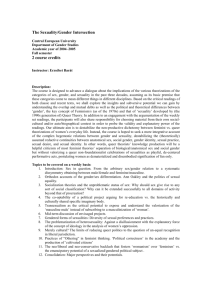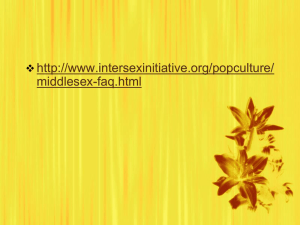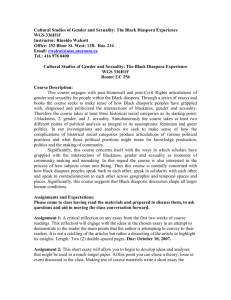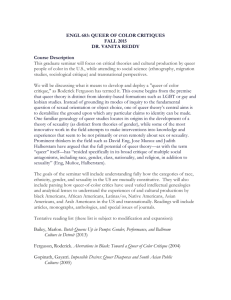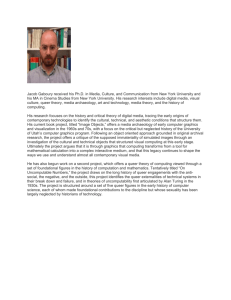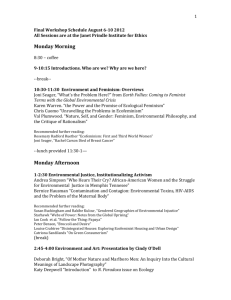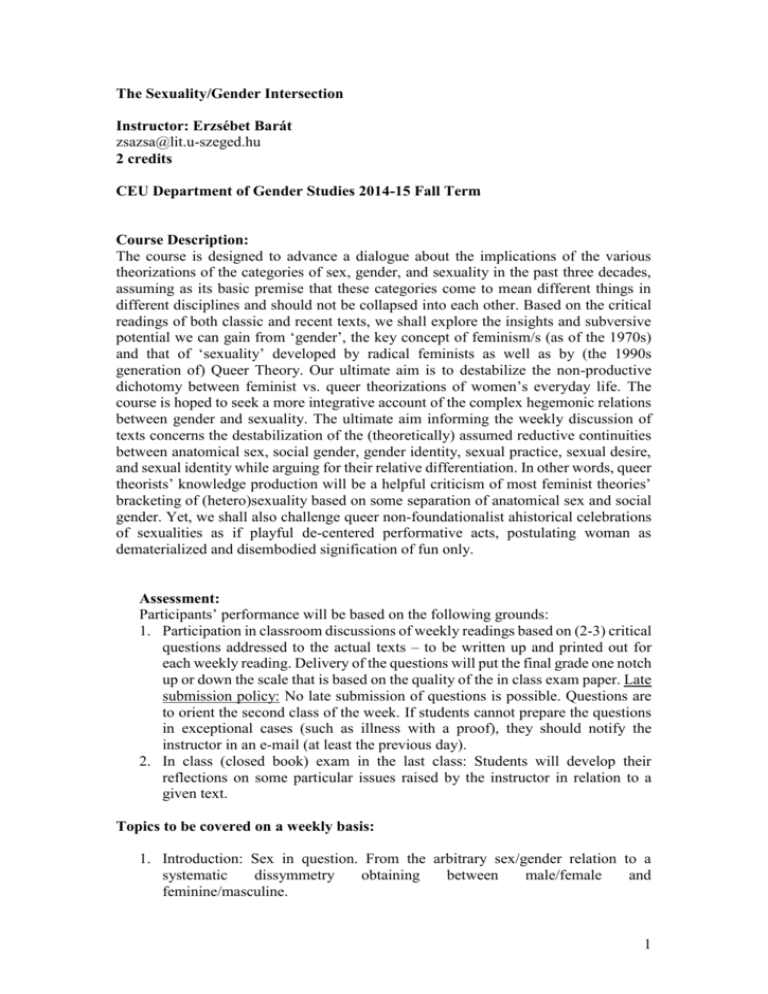
The Sexuality/Gender Intersection
Instructor: Erzsébet Barát
zsazsa@lit.u-szeged.hu
2 credits
CEU Department of Gender Studies 2014-15 Fall Term
Course Description:
The course is designed to advance a dialogue about the implications of the various
theorizations of the categories of sex, gender, and sexuality in the past three decades,
assuming as its basic premise that these categories come to mean different things in
different disciplines and should not be collapsed into each other. Based on the critical
readings of both classic and recent texts, we shall explore the insights and subversive
potential we can gain from ‘gender’, the key concept of feminism/s (as of the 1970s)
and that of ‘sexuality’ developed by radical feminists as well as by (the 1990s
generation of) Queer Theory. Our ultimate aim is to destabilize the non-productive
dichotomy between feminist vs. queer theorizations of women’s everyday life. The
course is hoped to seek a more integrative account of the complex hegemonic relations
between gender and sexuality. The ultimate aim informing the weekly discussion of
texts concerns the destabilization of the (theoretically) assumed reductive continuities
between anatomical sex, social gender, gender identity, sexual practice, sexual desire,
and sexual identity while arguing for their relative differentiation. In other words, queer
theorists’ knowledge production will be a helpful criticism of most feminist theories’
bracketing of (hetero)sexuality based on some separation of anatomical sex and social
gender. Yet, we shall also challenge queer non-foundationalist ahistorical celebrations
of sexualities as if playful de-centered performative acts, postulating woman as
dematerialized and disembodied signification of fun only.
Assessment:
Participants’ performance will be based on the following grounds:
1. Participation in classroom discussions of weekly readings based on (2-3) critical
questions addressed to the actual texts – to be written up and printed out for
each weekly reading. Delivery of the questions will put the final grade one notch
up or down the scale that is based on the quality of the in class exam paper. Late
submission policy: No late submission of questions is possible. Questions are
to orient the second class of the week. If students cannot prepare the questions
in exceptional cases (such as illness with a proof), they should notify the
instructor in an e-mail (at least the previous day).
2. In class (closed book) exam in the last class: Students will develop their
reflections on some particular issues raised by the instructor in relation to a
given text.
Topics to be covered on a weekly basis:
1. Introduction: Sex in question. From the arbitrary sex/gender relation to a
systematic
dissymmetry
obtaining
between
male/female
and
feminine/masculine.
1
2. Orthodox accounts of the gender/sex differentiation. Ann Oakley and the
politics of sexual equality.
3. Socialization theories and the unproblematic status of sex: Why should sex give
rise to any sort of decontextualized classification? How can it be extended
successfully to all domains of activity beyond that of procreation?
4. The co-optability of a political project arguing for re-education vs. the
historically and culturally specific imaginary body.
5. Transexualism as the critical potential to expose and understand the valorization
of the ‘masculine male’ instead of subscribing to a masculinization of ‘woman’.
6. Gendered forms of sexualities: Diversity of sexual preferences and practices.
7. The problematization of heterosexuality: Against a disillusionment with the
explanatory force of the concept of ideology in the analysis of women’s
oppression.
8. Performativity of gender: Collapsing sexuality and gender?
9. Merely cultural? Historical and cultural materialism. Queer politics and feminist
agendas.
10. Transgender studies’ critique of queer theory.
11. ‘Political correctness’ in the academy and the production of ‘cultivated citizens’
and the backlash that fosters ‘womanism’ over ‘feminism’.
12. Rethinking the politics of naming: The lost political edge of queer critique?
13. In-class exam.
Reading list:
Week 1:
Moira Gatens: “A critique of the sex/gender distinction”, 1983, pp. 3-20. + 1 page
(pdf)
Ann Oakley: “Sexuality” from Sex, Gender and Society. Harper and Roe, 1972, in
Stevi Jackson and Sue Scott (eds.) Feminism and Sexuality: A Reader, Edinburgh
University Press, 1996, pp.35-49.
Week 2:
Gayle Rubin (1975): “The Traffic in Women: Notes on the “Political Economy” of
Sex” in Linda Nicholson (ed.) The Second Wave of Feminism: A Reader in
Feminist Theory. Routledge, 1997, pp. 27-62.
Rubin, Gayle. “Thinking Sex: Notes for a Radical Theory of the Politics of
Sexuality” In Carole S. Vance (ed.) Pleasure and Danger: Exploring Female
Sexuality. London: Pandora. 1992. 267-293. (PDF)
“Sexual Traffic: Interview with Judith Butler” in Elizabeth Weed and Naomi
Schor (eds.) Feminism Meets Queer Theory, Indiana University Press, 1997,
pp. 68-108.
Week 3:
Christine Delphy: “Rethinking sex and gender” in Sex in Question. edited by Diana
Leonard and Lisa Adkins. Taylor & Francis. 1996, pp. 30-41.
Monique Wittig: “The Category of Sex”, “One is Not Born a Woman”, “The Straight
Mind”, in The Straight Mind and Other Essays, Beacon Press, 1992, pp. 1-32.
2
Week 4:
Denise Riley: “Bodies, identities, feminism” in Janet Price and Margrit Shildrick
(eds.) Feminist Theory and the Body, Sage, 1999, pp.220-226.
Celia Lury: “The rights and wrongs of culture: Issues of Theory and Methodology” in
Beverly Skeggs (ed.) Feminist Cultural Theory: Process and Production, Manchester
University Press, 1995, 33-45.
Week 5:
Julia Epstein: “Either/Or – Neither/Both: Sexual Ambiguity and the Ideology of
Gender” in Genders, Vol. 7. 1990, pp. 99-142.
Judith Halberstam: “Drag Kings: Masculinity and Performance” in: Female
Masculinity, Duke University Press, 1998, 231-266.
Week 6:
Tamsin Wilton: “The nature of the beast: What is a lesbian?” in: Lesbian Studies:
Setting an Agenda, Routledge, 1995, 29-49.
Majorie Garber: “Spare Parts: The Surgical Construction of Gender” in Vested
Interests: Cross-deressing and Cultural Anxiety, Penguin, 1992, pp. 93-117.
Week 7:
Steven Epstein: “A Queer Encounter: Sociology and the Study of Sexuality” in Steven
Steidman (ed.) Queer Theory/Sociology, Blackwell, pp. 145-167.
Celia Kitzinger and Sue Wilkinson: “Deconstructing hetero-sexuality: A feminist
social-constructionist perspective” in Nickie Charles and Felicia HughesFreeland (eds.) Practicing Feminism: Identity, Difference, Power, Routledge,
1996. pp. 135-154.
Stevi Jackson: “Heterosexuality, Power, and Pleasure” in Stevi Jackson and Sue Scott
(eds.) Feminism and Sexuality: A Reader, Edinburgh University Press, 1996,
pp. 175-179.
Week 8:
Judith Butler: “Imitation and Gender Subordination” in Henry Abelove et al (eds) The
Gay and Lesbian Studies Reader, Routledge, 1993, pp. 307-320.
Judith Butler: “Critically Queer” in Bodies That Matter: On the discursive limits of
“sex”, Routledge, 1993, pp. 223-242.
Week 9:
Nancy Fraser: “From Redistribution to Recognition?” In Justice Interruptus: Critical
Reflections on the Postsocialist Condition, Routledge, 1997, pp. 11-39.
Judith Butler: “Merely Cultural?” in New Left Review, No. 227, January-February,
1998, pp. 33-44.
Nancy Fraser: Heterosexism, Misrecognition and Capitalism: A Response to Judith
Butler, In New Left Review. No. 228, March-April, pp.140-149.
Week 10:
Erin Calhoun Davis: “Situating “Fluidity”: (Trans)Gender Identification and the
Regulation of Gender Diversity”, GLQ: A Journal of Lesbian and Gay Studies,
Volume 15, Number 1, 2009, pp. 97-130. (PDF on computer)
Queerforum:The Antisocial Thesis in Queer Theory, 2006. PMLA, 121 (3): 819-828.
(Contributions by Halberstam, Munoz and Dean). (PDF)
3
Week11:
Elizabeth Grosz: “Refiguring Lesbian Desire” in Naomi Zack et al (eds.) Race, Class,
Gender and Sexuality: The Big Questions, Blackwell, 1998, pp. 268-280.
Rosemary Hennessy: “Setting the Terms” in Profit and Pleasure: Sexual Identities in
Late Capitalism. Routledge, 2000, pp.1-36.
Week 12:
Judith Butler: “The End of Sexual Difference?” in: Undoing Gender, Routledge,
2004, 175-203.
Robyn Wiegman: The progress of gender: Whither “women”? In Robyn Wiegman
(ed.) Women’s Studies On Its Own. Duke University Press, 2003, pp. 106-140.
4

